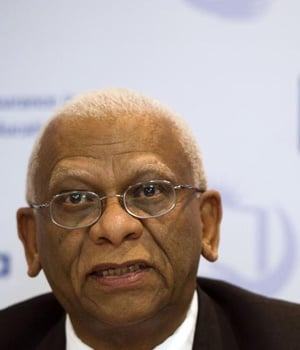
The matric pass rate will continue to fall in the next few years – because a policy of raising marks for pupils who do not speak English or Afrikaans as their first languages is being completely phased out.
So says Professor John Volmink, chairperson of education quality-assurance body Umalusi, who announced this week that this year’s pass rate was set to drop for a second consecutive year.
The matric pass rate peaked at 78.2% in 2013.
Last year, it declined to 75.8%, and the class of 2015 is set to fare even worse – by as much as 5%.
Volmink said the decline would continue in coming years because the language-compensation strategy, which Umalusi uses to boost the marks of African first language speakers, was being phased out.
Basic Education Minister Angie Motshekga will release this year’s matric results and pass rate at the Vodacom World auditorium in Midrand on Tuesday.
“It [the matric pass rate] is not going to be a huge drop,” said Volmink.
“Personally, I do not think it will go below 70%. According to the theory of large systems, declines and hikes are between two and three percentage points.”
Although the marks for African first language speakers are not increased “significantly” in terms of policy, Volmink said it would be critical to introduce intervention programmes to make up for the policy’s scrapping.
“It remains true that candidates writing the examination in a language other than their home language continue to experience great difficulty in interpreting questions and phrasing their responses,” he said.
“Teachers’ knowledge of English has to be upgraded. Unless we continue with wall-to-wall coverage of such programmes, the results will continue to drop.”
Umalusi, Volmink said, took a decision to phase out the language-compensation programmes because they did not increase the pupils’ marks by much and stigmatised pupils who did not use English and Afrikaans as their first languages.
Tough standards will remain
Meanwhile, Umalusi has rejected suggestions that the standard of matric question papers is too high and should be lowered to prop up the pass rate.
Although Volmink did not mention names, he said “some” people were arguing that the standard of the question papers was “too hard”.
He added that while there was reason to believe the rigorous standard of the question papers contributed to the decline in the pass rate, Umalusi would not lower the quality of the papers.
In an interview with City Press, Volmink said: “We do not make the papers hard because we want to lower the standards. We have to keep the bar where it is.
“We will not be helping anyone by lowering the standards. We are not prepared to lower the standards. That we cannot do.”
According to moderators from Umalusi and the national department of basic education, the quality of the standard was fair and in accordance with the subject assessment guidelines, he said.
Volmink added that the class of 2015 performed far worse in the exams than matrics in previous years.
“What we have is that the results were so bad that even a full computer adjustment will not get us to where we were last year. The results are so bad,” he said.
Volmink put the poor performance down to factors including tough question papers, a poor grasp of the English language by pupils who did not speak it at home, and increased vigilance against group copying.
He cited other factors, such as an improvement in the quality of marking and a weaker cohort of pupils that included “progressed learners” who were pushed into Grade 12 because of the department’s policy of not allowing pupils to fail more than one year in grades 10 to 12.
Basic education department spokesperson Elijah Mhlanga said the drop was expected for two reasons: the increase in the standard of question papers and the fact that it was the second time exams for the new Curriculum Assessment Policy Statement were written in matric.
Of the quality of the question papers, Mhlanga said: “People have been demanding quality question papers. We now have quality.”
‘Pass rate is meaningless’
Professor Sarah Gravett, dean of the faculty of education at the University of Johannesburg, said the fixation with the pass rate was a waste of time.
“The pass rate or number of people who passed means nothing.
“What is important is the number of people passing gateway subjects [such as maths, physical science and accounting] and the number of people passing with bachelor’s degrees and those gaining entrance to universities of technology.
“It is neither here nor there that the pass rate is increasing or decreasing,” she said.
Gravett acknowledged that Umalusi had increased the number of high-level questions on question papers in recent years.
“Umalusi is doing a good job in ensuring that the quality of question papers is on par with the rest of the world. They have to benchmark against the best in the world,” she said.
Godwin Khosa, an education academic and chief executive of the National Education Collaboration Trust, said the matric results needed to be used to inform education policy.
“The information is significant to the extent that we feed it into education policy. What does the information say about our education policy and the structure of our education system?” he asked.
“After the results are released, we should reflect on a macrolevel.




 Publications
Publications
 Partners
Partners








